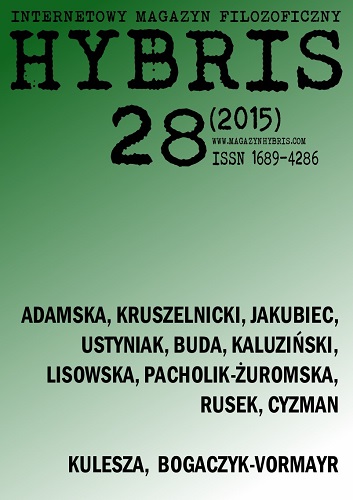Vulnerability as a perceptual category – Martha Nussbaum’s capabilities approach from the perspective of political aesthetics
DOI:
https://doi.org/10.18778/1689-4286.28.07Słowa kluczowe:
capabilities, vulnerability, perception, emotions, imagination, compassion, wonderAbstrakt
The aim of the paper is to draw politico-aesthetic consequences from Martha Nussbaum’s capabilities approach. It is argued that this can be achieved by focusing on the notion of vulnerability implied by the idea of capabilities. The recognition of the vulnerability of the human good inspires a new model of practical rationality based on perception. This idea, in turn, explores the aesthetic connotations of perception implied by its etymology (the ancient Greek for perception being aesthesis). Thus, political aesthetics is understood as the inquiry into the political consequences of the affinity between ethics and aesthetics, as well as the political relevance of the notion of beauty.
Bibliografia
Ankersmit, Frank R., 1996, Aesthetic Politics. Political Philosophy Beyond Fact and Value, Stanford University Press, Standford, California.
Zobacz w Google Scholar
Crocker, David A., 2007, Functioning and Capability: The Foundations of Sen’s and Nussbaum’s Development Ethic, [in:] Martha Craven Nussbaum, Jonathan Glover (eds.), Women, Culture and Development. A Study of Human Capabilities, Clarendon Press, Oxford.
Zobacz w Google Scholar
Nussbaum, Martha Craven, 1985(1), Aristotle’s »De Motu Aniamlium«, Princeton University Press, Princeton, New Jersey.
Zobacz w Google Scholar
Nussbaum, Martha Craven, 1985(2), The Discernment of Perception: An Aristotelian Conception of Rationality, [in:] eadem, Love’s Knowledge. Essays on Philosophy and Literature, Oxford University Press 1992, New York, Oxford, pp. 53-105.
Zobacz w Google Scholar
Nussbaum, Martha Craven, 1988, Nature, Function, and Capability: Aristotle on Political Distribution, “Oxford Studies in Ancient Philosophy”, pp. 145-184.
Zobacz w Google Scholar
Nussbaum, Martha Craven, Perceptive Equilibrium: Literary Theory and Ethical Theory, 1989, [in:] eadem, Love’s Knowledge. Essays on Philosophy and Literature, Oxford University Press 1992, New York, Oxford, pp. 168-194.
Zobacz w Google Scholar
Nussbaum, Martha Craven, 1992(1), Human Functioning and Social Justice. In Defense of Aristotelian Essentialism, „Political Theory” Vol. 20, No. 2, May 1992, pp. 202-246.
Zobacz w Google Scholar
DOI: https://doi.org/10.1177/0090591792020002002
Nussbaum, Martha Craven, 1992(2), Introduction: Form and Content, Philosophy and Literature, [in:] eadem, Love’s Knowledge. Essays on Philosophy and Literature, Oxford University Press 1992, New York, Oxford, pp. 3-53.
Zobacz w Google Scholar
Nussbaum, Martha Craven, 1995, Poetic Justice: The Literary Imagination and Public Life, Beacon Press, Boston.
Zobacz w Google Scholar
Nussbaum, Martha Craven, 2001, Women and Human Development. The Capabilities Approach, Cambridge University Press.
Zobacz w Google Scholar
DOI: https://doi.org/10.1017/CBO9780511841286
Nussbaum, Martha Craven, 2004, Hiding from the Humanity: Disgust, Shame and the Law, Princeton University Press, Princeton and Oxford.
Zobacz w Google Scholar
Nussbaum, Martha Craven, 2007, Frontiers of Justice. Disability, Nationality, Species Membership, The Belknap Press of Harvard University Press, Cambridge (Massachusetts), London (England).
Zobacz w Google Scholar
Nussbaum, Martha Craven, 2008, Upheavals of Thoughts. The Intelligence of Emotions, Cambridge University Press.
Zobacz w Google Scholar
Nussbaum, Martha Craven, 2009(1), The Fragility of Goodness. Luck and Ethics in Greek Tragedy and Philosophy, Cambridge University Press.
Zobacz w Google Scholar
Nussbaum, Martha Craven, 2009(2), The Therapy of Desire. Theory and Practice in Hellenistic Ethics, Princeton University Press, Princeton and Oxford.
Zobacz w Google Scholar
DOI: https://doi.org/10.1515/9781400831944
Nussbaum, Martha Craven, 2010, Not for Profit. Why Democracy Needs the Humanities?, Princeton University Press, Princeton and Oxford.
Zobacz w Google Scholar
Nussbaum, Martha Craven, 2011, Creating Capabilities. The Human Development Approach, The Belknap Press of Harvard University Press, Cambridge (Massachusetts), London (England).
Zobacz w Google Scholar
Nussbaum, Martha Craven, 2013, Political Emotions. Why Love Matters for Justice, The Belknap Press of Harvard University Press, Cambridge (Massachusetts), London (England).
Zobacz w Google Scholar
DOI: https://doi.org/10.2307/j.ctt6wpqm7
Rawls, John, 1987, The Idea of an Overlapping Consensus, [in:] Samuel Freeman (ed.), John Rawls. Collected Papers, The Belknap Press of Harvard University Press 1999, Cambridge (Massachusetts), London (England), pp. 421-448.
Zobacz w Google Scholar
Rawls, John, 1999, A Theory of Justice (revised edition), The Belknap Press of Harvard University Press, Cambridge, Massachusetts.
Zobacz w Google Scholar
DOI: https://doi.org/10.4159/9780674042582
Rozin, Paul et. alt., 2000, Disgust: the Body and Soul Emotion, [in:] Tim Dalgleish, Mick J. Power (eds.), Handbook of Emotions and Cognition, John Wiley & Sons.
Zobacz w Google Scholar
Sen, Amartya, 1979, Equality of What? The Tanner Lecture on Human Values, http://www.uv.es/~mperezs/intpoleco/Lecturcomp/Distribucion%20Crecimiento/Sen%20Equaliy%20of%20what.pdf (access: 7.03.2014)
Zobacz w Google Scholar
Sen, Amartya, 1992, Inequality Reexamined, Russell Sage Foundation (New York), Clarendon Press (Oxford).
Zobacz w Google Scholar
Sen, Amartya, 2009, The Idea of Justice, The Belknap Press of Harvard University Press, Cambridge, Massachusetts.
Zobacz w Google Scholar
Shelley, James, 2013, The Aesthetic, [in:] Berys Gaut, Dominic McIver Lopes (eds.), The Routledge Companion to Aesthetics, Routledge, London and New York, pp. 246-256.
Zobacz w Google Scholar
Winnicott, Donald Woods, 1951, Transitional Objects and Transitional Phenomena, [in:] idem, Collected Papers, Tavistock 1958, London, pp. 229–242.
Zobacz w Google Scholar
Pobrania
Opublikowane
Jak cytować
Numer
Dział
Licencja

Utwór dostępny jest na licencji Creative Commons Uznanie autorstwa – Użycie niekomercyjne – Bez utworów zależnych 4.0 Międzynarodowe.
Funding data
-
Narodowe Centrum Nauki
Grant numbers DEC-2013/09/N/HS1/02864






